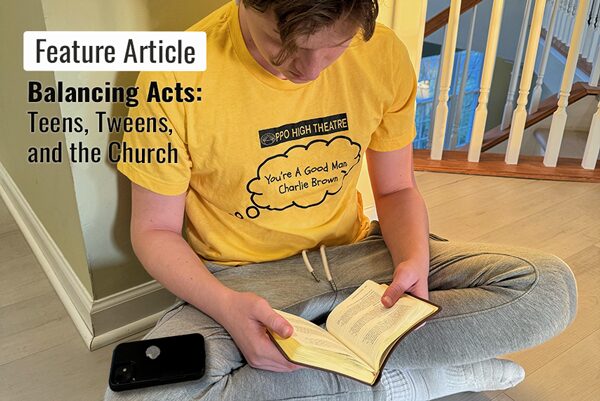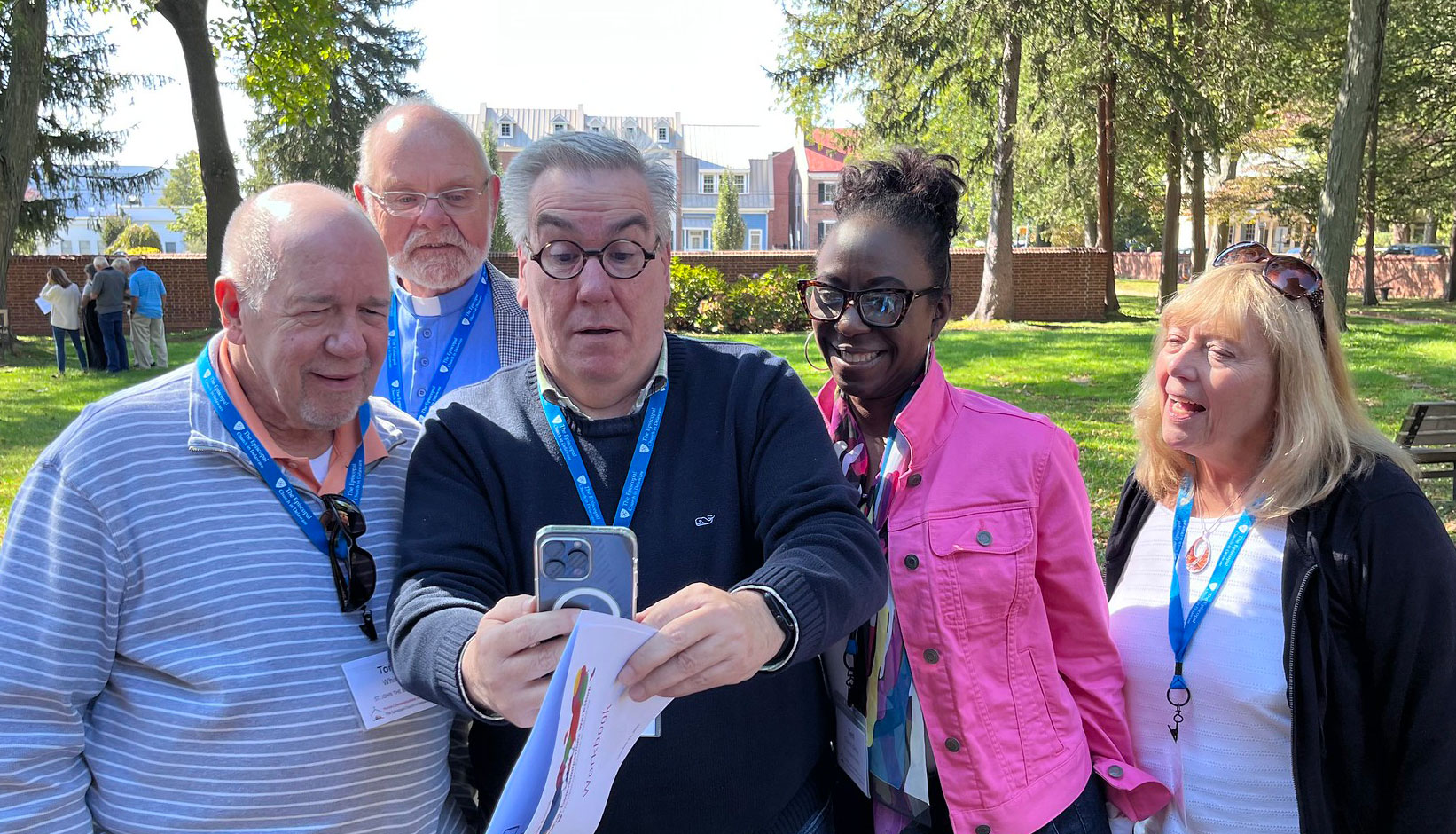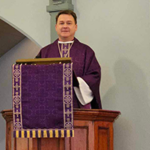This website uses cookies so that we can provide you with the best user experience possible. Cookie information is stored in your browser and performs functions such as recognising you when you return to our website and helping our team to understand which sections of the website you find most interesting and useful.

Balancing Acts:
Teens, Tweens, and the Church
“Engaging today’s teens and tweens in church can be daunting, but is not impossible. Like anyone else, youth want their perspectives and needs to be seen and valued.” — Kristin Sausville
by Kristin Sausville
Today’s teens and tweens are at a unique inflection point. The eldest are at the tail end of Generation Z, and the youngest begin what is currently referred to as Generation Alpha. Often the line between generations can blur somewhat — the micro generation born between the late 1970s and early 1980s, being referred to by multiple names including Xennials and the Oregon Trail generation — but a clearer line of demarcation emerges in this case as the Gen Z cohort was in middle school and high school during the height of the COVID pandemic, while the Gen Alphas were in elementary school. Both generations, however, have one thing in common: they both attended school via Zoom during the pandemic.
What effect did this have on these children, and how does that relate to their experience of The Episcopal Church? What can we learn about their experiences and perspectives to help make our churches more welcoming to and inclusive of them?
The day-to-day secular life of today’s teens and tweens poses many challenges for Episcopal churches that want to reach them. Their parents were younger Gen X or Millennials who were less likely than their own Boomer parents to attend church, so they don’t have a family tradition of parents taking their children to church. Weekend events and activities continue to grow in popularity. The younger ones are expected to start participating in activities outside of school, and by the high school level, many school-related activities have begun to spill over to the weekends as well.
Screens are omnipresent, and while many teens and tweens crave in-person interactions, especially as we emerge from the COVID pandemic, online interactions even with their friends can feel more secure. Their generations are also increasingly diverse in terms of religion; their friend groups may include Christians, Muslims, Hindus, “nones,” and atheists. They are more likely to identify as LGBTQ+ than previous generations, which can conflict with a growing perception of Christianity as being unwelcome to them. The popular perception of Christianity is also associated with everything from sexual abuse scandal to the embrace of nationalism.
Perhaps the greatest challenge is that changes in day-to-day secular life have had an enormous impact on how people spend their weekends. One consequence with the rise in families having both parents in the workforce, is that it has pushed sports and other recreational activities to the weekends. Travel sports in particular play an outsized role here. Youth do need these outlets in their lives, and it would be foolish and counterproductive to pretend otherwise, but it is hard to find solutions for the issue of getting teens and tweens to come to church when they have other activities at the same time. It is hard to convince youth and their parents to prioritize church when they have concerns about their children being at a disadvantage for future opportunities in sports, music, dance, theater, and other extracurricular activities in high school and college without building foundational skills as youth. This may be a place where options like live-streaming or services at non-traditional times can be a way to show youth that we are willing to meet them where they are.
Another way to meet teens and tweens where they are is social media engagement. These generations are rarely on Facebook with their parents and grandparents, but are very active on services like Instagram, Snapchat, YouTube, and TikTok. Instagram and Facebook are both owned by Meta, and so parishes that are engaging people on Facebook can easily cross-post to Instagram, reaching a wider audience that is more likely to include teens and tweens. One discussion point at the Parish Communications Workshop in the fall was that Reels — short video clips — on Instagram had a higher rate of engagement with people who weren’t already following their accounts. The same video used for a Reel can easily be uploaded from someone’s phone separately to TikTok, growing its reach even more.

2023 Parish Communications Workshop.
One of the most beautiful aspects of The Episcopal Church is its embrace of the marginalized, specifically welcoming members of the LGBTQ+ community. We seek to truly live out the commandment to love God and our neighbors as ourselves. A challenge is that it is not widely known in the wider unchurched population that The Episcopal Church differentiates itself in this way. What they see in the news and media are people professing Christianity while embracing homophobia, censorship, and nationalism. This can make our teens and tweens hesitant about public professions of faith. Is it okay to wear a cross necklace to school or on a college tour, or will that cause people to make assumptions about their beliefs that aren’t true?
Young people can be too intimidated to invite unchurched friends to a service. Our churches can help them by providing ways to invite their friends to church activities other than services. Events like overnight lock-ins and movie nights are low-pressure ways for our youth to invite their friends to attend a church event. These children may not end up joining a congregation themselves, but they will be aware that Episcopal churches exist and welcome them. Youth should also be encouraged to invite their friends to Confirmation; while a religious service, it is an important moment in a teen’s life that their friends may be willing to attend in support.
Camp Arrowhead is another wonderful way for our youth to include their friends. Many families are looking for sleep-away camp opportunities for their children, and an invitation from a friend goes a long way to vouching for both fun and safety. We are blessed to have such a beautiful facility in an ideal location, and in my own family’s experience, many of the friends my teens have invited over the years became repeat campers themselves.
We can also help our teens and tweens frame their care for the marginalized by showing them that Jesus is the framework for our love and action. Generations Z and Alpha want to see what people are doing with their faith; they believe that actions demonstrate sincerity. Today’s youth value community service and want to participate in it; we can teach them that these actions are our expression of our faith.

There are other opportunities to get youth outside of the church involved, where they can learn about our faith and liturgy. For example, St. Thomas’s Parish in Newark has developed a live-streaming internship program, in which a local high school student learns how to use our equipment and then assists with the live-streaming of our services. Through this, we welcome youth and show them that we care about providing them skills they can use in their future.
Another aspect of these generations that separates them from their elders is their different sensory needs. Neurodiversity (i.e., conditions like autism and ADHD) is both on the rise and better understood than they were in the past. Sitting on hard pews for long periods is hard for these youth, which can make going to church an uncomfortable experience. One way that churches can show these youth that they are welcome and cared for is to acknowledge this need by creating soft spaces. One parish in our diocese has done this by turning its underutilized balcony into a sensory-friendly loft. There are soft chairs, couches that can be configured into different shapes, stuffed animals large and small, and rugs — all of which accommodate different seating needs. Children under twelve are required to be accompanied by an adult.
On a positive note, the Episcopal Church in Delaware has made progress in offering ways of reaching out and engaging its youth. Parishes are encouraged to send young adult delegates as young as sixteen to the Annual Convention, where they have equal voice and vote to the adult delegates. This demonstrates that our youth are considered not just the future of the Church, but that their voices and perspectives are needed and valued now. There is also an effort underway to create more diocesan-wide events for youth.

Engaging today’s teens and tweens in church can be daunting, but is not impossible. Like anyone else, youth want their perspectives and needs to be seen and valued. Episcopal churches can build on what they are already doing by acknowledging and working with specific challenges, focusing on showing them how our shared love and actions for the marginalized come from following Jesus, and giving them opportunities to include their unchurched friends in ways that are welcoming to them.

Kristin Sausville is a contributor for the Delaware Communion Magazine and the senior warden at St. Thomas’s in Newark. She is a mother of two boys, wife, and world traveler. A bit of trivia: Kristin is a five-time Jeopardy champion.






